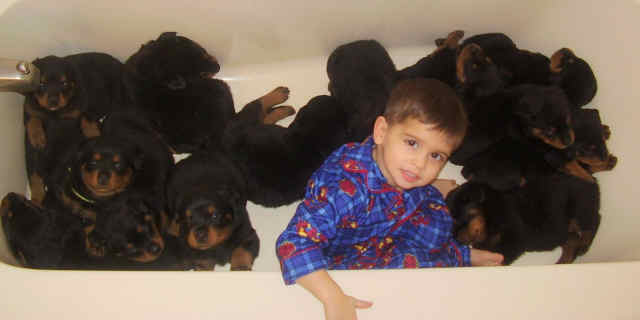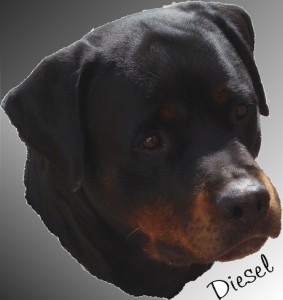“Anybody who doesn’t know what soap taste like never washed a dog.” -Franklin P. Jones
Grooming is not only essential for a happy healthy dog, but it is also a great time to familiarize yourself with your Rottweiler. If you establish these habits while your puppy is young, you will not only reinforce good training for your dog, but also quickly learn what is normal for your dog which will ensure earliest recognition of any health concerns, ear infections, skin issues, parasite infestations, and tumors before they become serious.
SKIN AND COAT
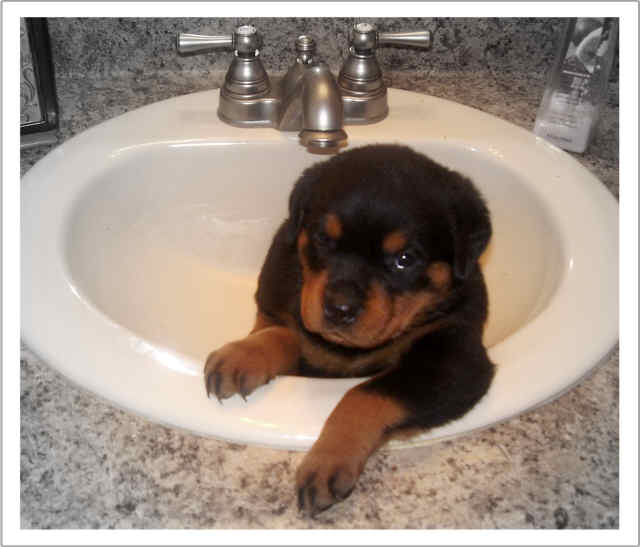 Even though the Rottweiler has short hair, brushing is still very important not just to reduce shedding, but also loosen and remove dirt, dead hair and skin cells. It also helps to distribute the skins natural oils to help maintain that beautiful, shiny coat. Brushing a couple times a week will help keep you Rottweiler looking his best. Our favorites are those black rubber grooming mitts available at most pet stores, and, especially in the winter, a Bamboo slicker wire brush or rake for the undercoat.
Even though the Rottweiler has short hair, brushing is still very important not just to reduce shedding, but also loosen and remove dirt, dead hair and skin cells. It also helps to distribute the skins natural oils to help maintain that beautiful, shiny coat. Brushing a couple times a week will help keep you Rottweiler looking his best. Our favorites are those black rubber grooming mitts available at most pet stores, and, especially in the winter, a Bamboo slicker wire brush or rake for the undercoat.
BATHING
Although cleanliness is next to godliness, too much bathing can irritate your dogs skin. (See Dry Skin on my Rottweiler Health page.) Dog’s do not have sweat glands like we do and consequently do not produce the excess oils we do and do not need to bathe as often. Over bathing will strip what little oil they have away causing dry skin and dull coat. We recommend only about once a month and with a gentle shampoo. My favorites are the oatmeal shampoo’s as they are very soothing to the dogs skin.
If you begin bathing the pup at a young age, he will be used to it by the time he is 100+ pounds and a bit more difficult to manage. If you live in the Indianapolis, IN area, Pet Supplies Plus has a dog grooming station where you pay a small fee (I think $10) and they supply the elevated grooming station with sprayer, shampoo, and puppy dryer.
Bathing tips:
• Make sure you rinse the dog thoroughly to remove all soap residue to avoid drying out the dog’s skin.
• If the dog has paint, tree sap, salt, mud, or burrs in her fur, apply vegetable or mineral oil to the affected area for 24 hrs. then wash away with soap and water.
• Gather everything you will need for bathing the dog close enough to grab before you start (or your dog will take off leaving a trail of soap and water all over your house, walls, etc. :)’
• Place cotton balls in the dog’s ears to avoid getting water inside the ear.
• I also use my nifty rubber grooming glove when bathing as well to help really get under all the fur especially when they’ve been playing in the mud.
Remember that when you are bathing a puppy, he must be kept warm after the bath, just like a baby. Dry him as much as possible with towels immediately after his bath. You may use a dryer on warm to help finish drying him, but keep it at least a foot away from the puppy and moving to avoid burning his skin. Also make sure he is in a warm room/ place until completely dry.
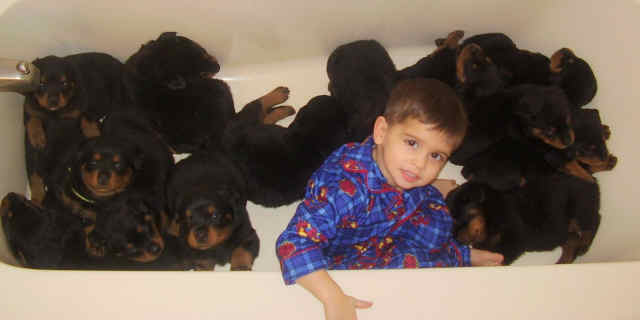
SHEDDING
Although Rotties do not typically shed in excess, they do have a double coat so expect some shedding. Routine grooming will cut down on the shedding significantly, however, a dog will have increased shedding directly after a bath as you have loosened all the dead hair and skin cells. They will also “blow out” their coats twice a year when they shed their “winter coat” for a “summer coat” and then put the winter coat back on. A bitch coming into season will almost always blow a coat as well. Stress or illness can also increase shedding, so be mindful if your dog is shedding more than he normally does.
FEET AND NAILS
This is the part that usually receives the most protest from dogs, but if you begin early and do it right, the task can be accomplished without too much drama. On animals with white nails, it is much easier to see where to trim as you can see the “quick”. (I believe it is so named because the dog will let you know real “quick” if you nick this!) However, on Rotties it is much more difficult as they have black nails. If you do cut the quick it is painful to the dog and it will bleed. If this happens you can use Styptic Powder to stop the bleeding.
It is important to keep your dog’s nails trimmed, so if the task is too much for you, no worries; most vets will do it free or for minimum charge when you have an appointment, and grooming salons usually charge $10 or less for a nail trim.
EARS
Ears should be cleaned at least once a month. I just make it part of my bathing routine. Always inspect inside for dirt, scratches, redness, parasites or discharge. And as gross as it sounds, smell them. There should not be any unpleasant odor. A bad odor can be an indication of a yeast or other infection. If this occurs, take you dog to the vet. Another good indicator is if your dog shakes his head excessively or scratches at his ears. Moisten a cotton ball with mineral oil or ear cleaner and wipe out the ear. Do not go deeper than the first knuckle on you finger. Take care to keep you dog’s ears clean and dry to avoid serious ear infections that can be difficult and expensive to treat.
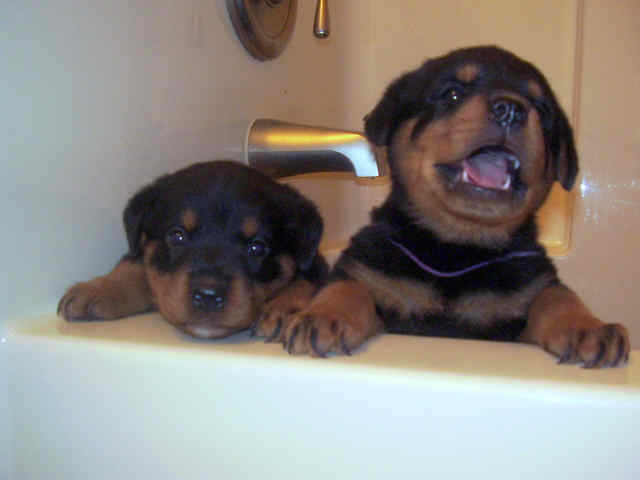
TEETH
A dog’s teeth are probably the most neglected area’s of grooming, but one of the most important. Food and saliva causes a buildup of soft plaque on your rottie’s teeth which then hardens into tarter. Bacteria trapped in the plaque contribute to dog breath and periodontal disease. By keeping your dog’s teeth clean, you can prevent or decrease the need for expensive vet cleanings which require your rottie to be anesthetized. Your dog’s teeth should be cleaned often. As a puppy you can start with the little rubber finger brush (available at pet stores) or even a gauze pad. As she gets bigger you can use doggy tooth brushes and toothpaste. Never use human toothpaste on dogs as it will cause upset stomach when swallowed. You can make a homemade toothpaste out of baking soda and water.






